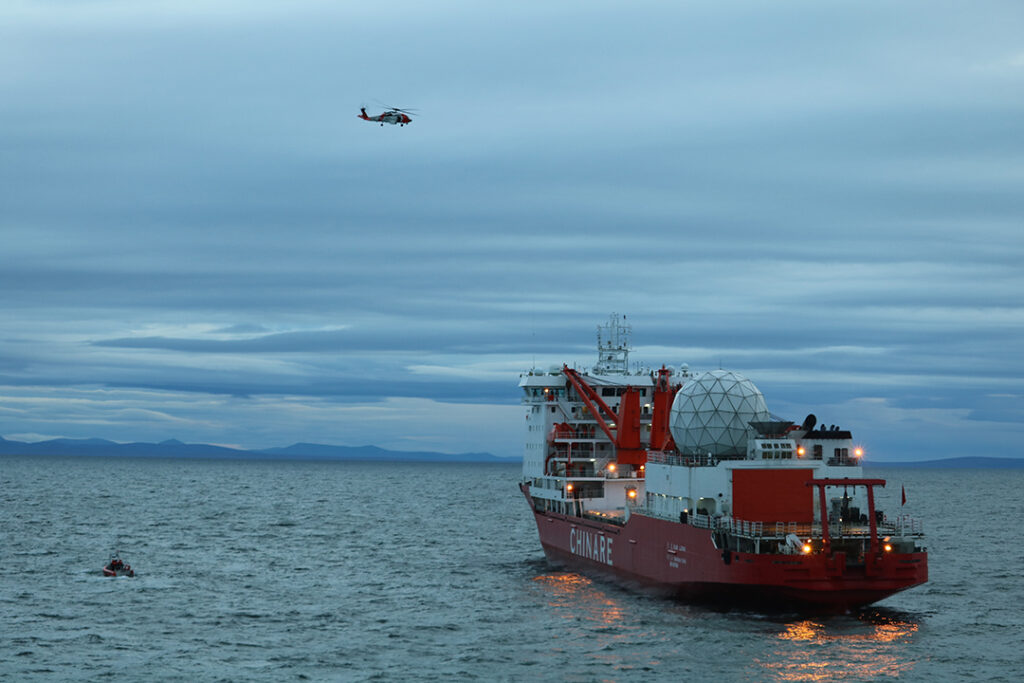U.S. STRATEGIC COMMAND
Within the past 20 years, the People’s Republic of China (PRC) has demonstrated an interest in the frigid waters of the Arctic Ocean, but is its claim to the northernmost sea legitimate? The Arctic Council’s answer is a resounding “no.”
The Arctic Council is an organization comprised of the eight nations whose borders touch the Arctic Ocean: Canada, Denmark, Finland, Iceland, Norway, Russia, Sweden and the United States. The council’s decisions revolve around environmental action, scientific programs and assessment, and emergency preparedness, and they provide recommendations to other world organizations. Council members have claims to territory within the Arctic Circle, although 13 countries with a vested interest in the Arctic have been granted observer-nation status. That means they are allowed to attend council meetings, but have no voice in the decisions. One of the most outspoken observer nations is the PRC, which has made recent claims of having a stake in the territory and waters of the Arctic Ocean.
The PRC has declared itself a “near-Arctic nation,” which is an ironic statement coming from a country whose closest territory to the Arctic Circle is over 1,400 kilometers away. The PRC has used this argument as justification to infringe upon the carefully managed waters of the North. (Pictured: A crew from the U.S. Coast Guard Cutter Alex Haley medevacs a man with a broken arm from the Chinese research vessel Xue Long in September 2017 about 15 nautical miles from Nome, Alaska.)
Chinese interest in the Arctic centers on four key elements: military expansion, resources, trade access and illegal fishing opportunity. Their military interests heavily mirror Russian military interests. Because Russian military power is so heavily reliant on the Arctic, Chinese Communist Party General Secretary Xi Jinping has announced the PRC’s intent to send military vessels into Arctic waters. The PRC wants to find an operational answer that counters Russian military developments in the Arctic Ocean and possibly begin to utilize the High North as a new strategic frontier. Chinese resource interests are in the estimated 90 billion barrels of natural gas —roughly 13% of the world’s supply — that resides in the Arctic region. As one of the world’s greatest oil consumers with the highest level of greenhouse-gas emissions and no identifiable interest in changing that trend in the near future, the PRC’s interest in the fuel reserves is transparent.
Its interest in trade access is straightforward as well. The Trans-Polar Sea Route, which is projected to be accessible in the next 20 to 30 years, across the North Pole shortens the PRC’s maritime trade distance to Europe by nearly 7,000 kilometers. China’s final interests are in the fishing opportunities that reside in the Arctic’s northern waters. China has nearly depleted the supply of fish in the South China Sea, and even now sends mariners to illegally fish in the surrounding South America. The PRC has demonstrated an unwillingness to abide by international norms and law if it means it can tap into accessible resources.
Although this situation is something that could lead to disastrous outcomes for the Arctic nations, it has led to a rare moment of agreement between Russia and the U.S. Both countries have vocally condemned the PRC’s military infringement into Arctic waters and are unified in their firm stance that any Chinese military expansion into these waters will have disastrous outcomes. The U.S. wants to stop Chinese utilization of the Arctic as a Polar Silk Road, which would help it expand its One Belt, One Road infrastructure scheme. This initiative is the Chinese long-term economic plan that it extends to countries around the world to build different types of infrastructure that will act as the ultimate trade platform for a future global monopoly. Russia’s fears are more focused on Chinese military infringement. Russia is the country with the most land bordering the Arctic, and Chinese military development is a major threat. Despite shallow military agreements with the PRC, Russia has declared China as its long-term global competitor and understands that the PRC is the threat of the future.
As the uncertainty of Arctic development hangs in the ether, the unified message of the Arctic Council resounds: Arctic waters are for Arctic countries only. Chinese encroachment counters everything the council represents: protection of ecology, scientific development and emergency preparedness. Xi’s intentions are to deplete natural resources, devastate more of the world’s sea life and threaten the world with military expansion. The PRC must cease its belligerent infringement or be prepared to face international repercussions.
IMAGE CREDIT: U.S. COAST GUARD

